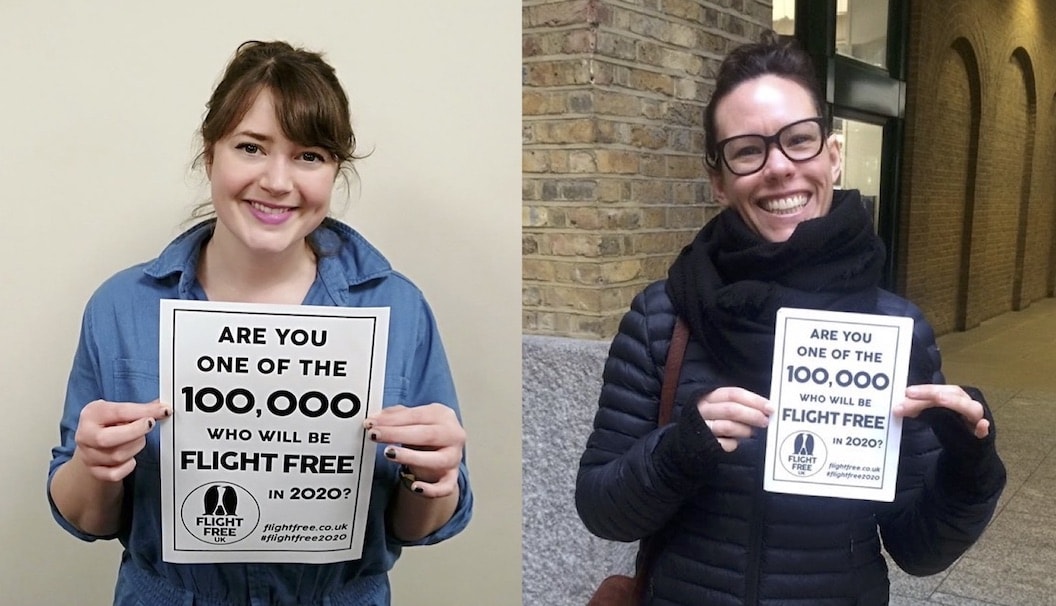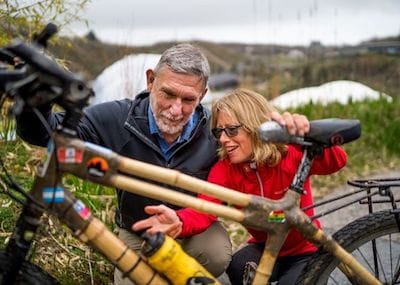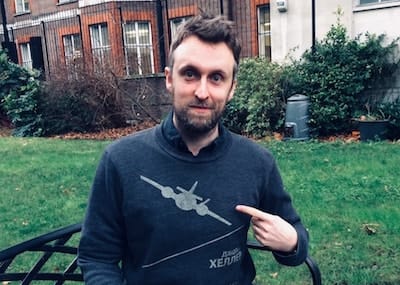This podcast is episode 5 of our #FlightFree2020 series. You can listen to the podcast, and access the rest of the series, at our podcast page.
This month’s podcast is on the subject of carbon offsets and green technology and we’re talking to Roger Tyers, a research doctorate at Southampton university. Roger has written a few articles for us in the past: The Truth about Carbon Offsets, What the Aviation Industry Really Thinks About Climate Change, and Long Train to China. We met up with Roger at the British Library, so while you might imagine the library is impeccably silent, there’s occasionally some background noise.
You can listen to the full podcast here.
Flight Free UK:
Many airlines have ambitious targets to be carbon neutral, and have lots of impressive publicity saying how they can achieve this, and it seems to rely on green technology and heavy use of carbon offsetting. There are even claims that passengers can ‘fly carbon neutral’ if you pay a little extra for an offset. So we want to get to the bottom of what that means, and if it's viable. So let's start by asking, “What is carbon offsetting and how does it claim to work?”
Roger:
Carbon offsetting is calculating how much carbon is created from whatever activity we do, and paying for that same amount of carbon to be taken out of the atmosphere elsewhere. So you might create a ton of carbon from flying from A-B, but if you pay some extra money on your ticket, the airline will arrange for a tonne of CO2 to be taken out of the atmosphere in another way. A classic way is planting trees. It can also go towards renewable energy, solar instalments, or wind farms.
Another method is to prevent carbon going into the atmosphere in the first place. This is a bit more complex. e.g. funding clean cookstoves in the developing world, which use less wood, reducing emissions and not using so many trees.
Finally, there are mechanical ways of extracting GHGs from the atmosphere e.g. methane capture from landfill sites, or direct carbon capture and storage.
Flight Free UK:
So in simple terms, offsetting is compensating for the amount of CO2 you emit by absorbing it elsewhere. But how can something that you emit today be somehow balanced out by funding a project that may or may not absorb the same amount of carbon somewhere down the line? This reveals the first of our offset problems, and that is with ‘time.’
In the article that Roger wrote for us, he said, ‘a flight taking off today emits its carbon today. Waiting for trees to mature to the stage when they can remove that carbon takes many years or even decades – time which we simply might not have to spare in avoiding climate breakdown.’
Roger:
It’s easy to create carbon emissions, but taking carbon out of the atmosphere generally takes a long time. Trees can take 20-30 years before they absorb the necessary amount of carbon. We might not have that time – the next 10/11 years is crucial, so trees might not be the answer, especially as flying is such a quick way of creating pollution and trees are such a slow way of sucking it back in.
Flight Free UK:
There’s a post on our website, entitled ‘Why we stopped carbon offsetting our flying,’ written by Linda Thomas, who writes,
‘We started planting trees that would absorb our CO2 and pump out oxygen in the process. It was win/win. In effect we had thrown money at the problem.But trees take a long time to grow. This climate issue was urgent and we were banking on trees letting our emissions off the hook over the next 100 years, and they might not even last that long.”
There's also the issue of biodiversity. As Roger has suggested, trees are the poster child of carbon offsets, but they have to be the right trees. That might sound like a strange thing to say, but planting monocultures, which is often what happens, is a disaster for biodiversity, and it's not very good for the climate either. The best carbon absorption comes from mature, well-established woodlands and forests, with a variety of plants and species, native to the area, and with different levels of vegetation. So, trees, perhaps not the offset answer they first appear to be.
"The best carbon absorption comes from mature woodlands and forests, with a variety of species, native to the area, and with different levels of vegetation."
Another problem with offsets is what we call ‘additionality’. We want our money to go towards something that otherwise wouldn't have happened, otherwise it doesn’t ‘neutralise’ our flight at all. A recent report suggested that 85% of offset schemes failed to reduce emissions. This was because they weren't what’s called, ‘additional’ – the money went to projects that would have been funded anyway, so there was no increase in emissions reduction, which meant that they couldn’t be said to effectively offset whatever they were supposed to offset.
Roger:
It’s also complex – geographically, it’s very far removed from your activity. The scheme has to take place, and it has to be verified, and all the time you’re adding layers of bureaucracy and delays to the whole process. So it seems very easy to click a box and add a few quid to your flight, but if you look behind that, there’s a great possibility for that money to not go where it’s supposed to go – and there have been many fraud scandals.
Flight Free UK:
Fraud scandals aside, let's give offsetting a chance. There is such a thing as the Gold Standard – a certified scheme that presumably doesn’t result in fraud, or in the money not funding extra carbon-reduction measures. But we come back to issue of time – even the gold standard schemes take time to make the equivalent reduction in carbon, and all the while the airline is telling its passengers they can fly carbon neutral. It’s a very attractive strapline, but is flying carbon neutral ever the case?
Roger:
No. At least not with any realistic timescale. Yes, your flight might become carbon neutral in 20/30 years, the amount of time it might take for a renewable energy project to get off the ground, or the amount of time it might take for trees to mature, but as Keane said, in the long term… we’re all dead.
Flight Free UK:
Joking aside, the stark fact that Roger’s alluding to here is that life on earth as we know it is simply not going to continue unless we urgently address our carbon emissions, and we have a very short window in which to do it. So, frankly, offsetting a flight is at the tiny end of what we need to be doing.
Here in the west, our lifestyles are already extremely carbon heavy – even someone who doesn’t fly at all, and takes other big steps like using renewable energy, or not eating meat or animal products, or not driving, will still have a carbon footprint that is among the largest in the world. So we should already be compensating for this huge burden we’re putting on the planet, and taking steps to remove this carbon through reforestation or restoring peat bogs or protecting our oceans anyway. The way our society is set up, we’re already well over our carbon budget with the essential stuff that we need for life, like housing ourselves and clothing and feeding ourselves – never mind flying away on holiday. We should already have the structures in place so we can work with nature, not see it as a commodity that we can throw money at in order to somehow compensate for our lifestyles.
And this is the third problem with carbon offsetting: ethics. Arguably, offsets don’t actually change anything, they just give us licence to continue our polluting behaviour. And that’s the main sticking point for us as a behaviour change campaign: carbon offsetting doesn’t lead to behaviour change, which is what is *really* needed.
Roger:
This is when we get into knotty ethical debates. There are some people who buy carbon offsets as a last resort, but recent research by EasyJet, who buy offsets for all of their flights, shows the people who are more aware of the offset scheme are more satisfied with their flight. That suggests that carbon offsetting makes people feel better about their flight.
"Carbon offsetting makes people feel better about their flight. The implication is that there is moral licence to continue that behaviour, rather than change it."
The implication is that there is moral licence to continue that behaviour, rather than change it – which is what we really need to do. If offsets do anything to make that less likely, then they are dangerous.
Flight Free UK:
And this brings us back to the claim by airlines that their passengers can fly carbon neutral. We want to believe it because we don't want to alter our lifestyles, so we take it on face value – why shouldn’t we? But it's a questionable claim when the only way to really be carbon neutral is not to take that flight.
Environmentalists have disagreed about the merits of offsets for years. Some say reduce your emissions as much as you possibly can and offset the rest. We say, reduce your emissions as much as you possibly can. This is not to say that some offset schemes are not worthwhile. But it’s probably best summed up by the Aviation Environment Federation Deputy Director Cait Hewitt: “At best, offsets might be able to do some good somewhere in the world but they won’t stop CO2 coming out of the back of the aircraft.”
So, onto the second subject in our podcast, which is green technology. If we can’t reliably reduce our emissions through offsetting, is technology the answer? Roger gives us a quick rundown of what's available.
Roger:
Sustainable aviation fuels or biofuels have a much lower footprint than kerosene, but they’re currently only being produced at a fraction of what is needed to keep all the planes in the sky. 10-15 years ago, it was predicted that biofuels might be 1/4 or 1/2 of aviation fuel by now, but it's still less than 1%.
Electric planes are possible for a small number of people over a short distance, so it might be feasible for short haul in the next few decades, but never for long haul. But any changes are going to take a long time – Airbus or Boeing will be delivering variations on 737 or 747 for the next 20 years, and not using the new technology.
Flight Free UK:
Let's not forget that none of these techno fixes are without environmental impacts. For example, batteries for electric planes require lithium and cobalt – both rare earth metals that cause a lot of destruction and human suffering in their mining. Some commentators have said that we can have electric vehicles, or electric planes, but there just aren’t the resources to have both.
And as for biofuels, or synthetic fuels – it takes fossil fuels to make them, and they aren’t used pure, but rather mixed with kerosene. And a big issue of biofuels is that they’re incredibly destructive to grow – palm oil for example is a major driver of deforestation. These are absolute no-nos for the climate crisis and biodiversity crisis.
Roger:
If you're mass-producing biofuels from unsustainable sources, and grabbing land from other uses such as feeding people, purely to create fuel so people can go on holiday, then it seems a bit like we’ve got our priorities wrong.
We need to change people’s behaviour and reduce demand, not just rely on technology coming to the rescue.
"We need to change people’s behaviour and reduce demand, not just rely on technology coming to the rescue."
We are capable as a species of some quite amazing and rapid developments, especially in times of war. e.g. ultrasound, ground to air radio, the sanitary towel, nuclear power – these things come out when we have our backs to the wall. The problem now is that we have cheap, untaxed fuel which is keeping the aviation industry going, and the incentive to create new, game-changing technologies isn’t there. If we squeeze the industry through taxes and other demand-reduction measures, we might see these changes come about more quickly.
Flight Free UK:
Our current situation with coronavirus might be the ‘backs to the wall’ moment that we need in terms of incentivising these changes. With airlines struggling, campaigners are asking governments to attach strict climate conditions to any bailout packages.
After considering all of the options in terms of offsetting and green technology, it seems the single best way to reduce your carbon footprint remains the most simple one: fly less.
You can read more relevant articles on our website:
The Truth about Carbon Offsets
Can technology make air travel sustainable?
Six and a half flying ideas for the future
You can listen to this full podcast, and access the rest of the series, at our podcast page.
Credits: interview conducted and recorded by Anna Hughes. Intro voiceover: L. Sophie Helbig. Sound effects: Josh Hill.




